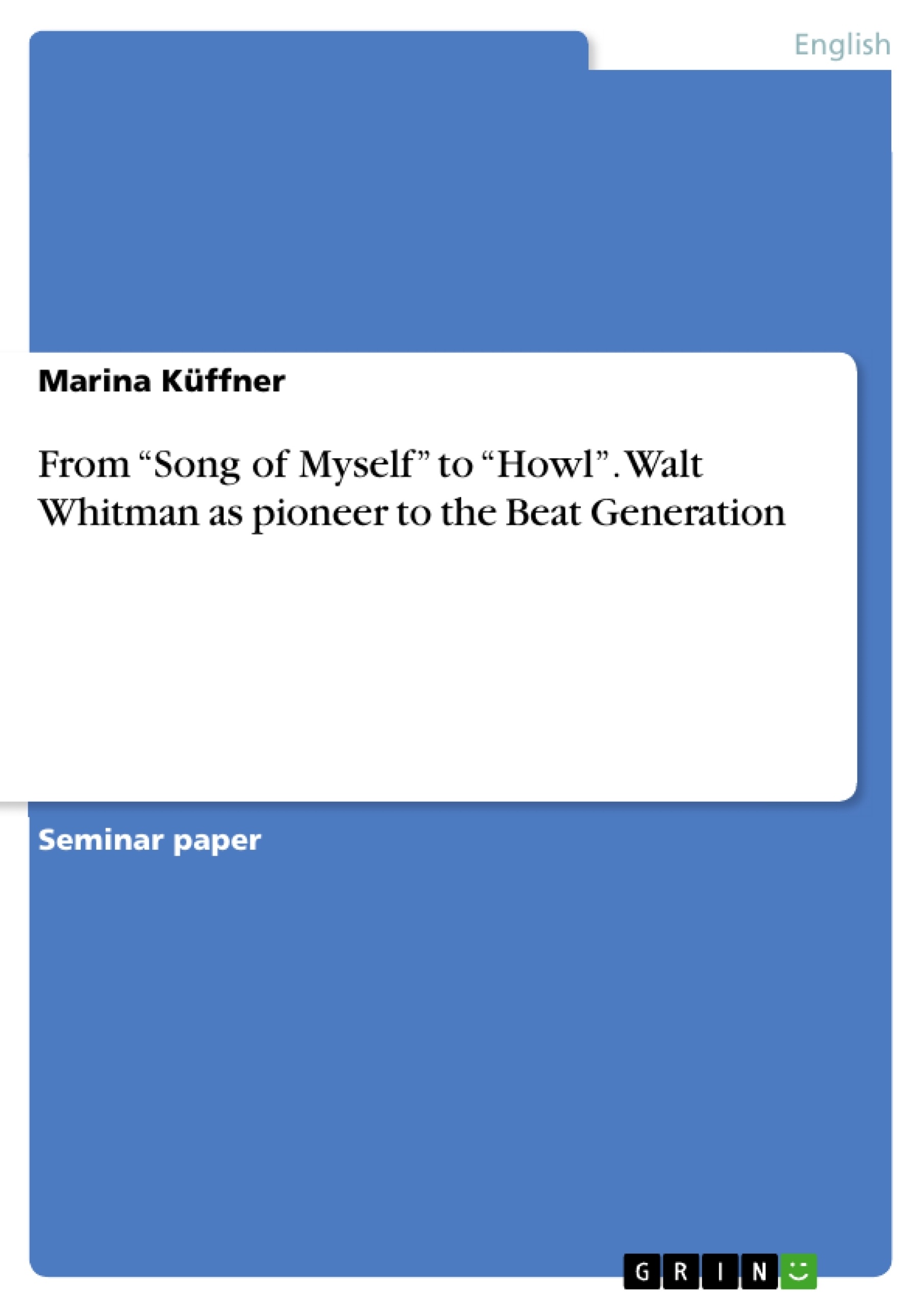Allen Ginsberg was deeply influenced by Walt Whitman, especially by Whitman’s major work "Song of Myself". They both were poets who tried to be a voice for the people, and who wanted to experience closeness in a time of growing distance between the people.
This paper will compare Walt Whitman’s "Song of Myself" with Allen Ginsberg’s "Howl" concerning their intention as well as their big similarities of style and themes, even though there is nearly a century between their works. The lack of regularity and the many sexual metaphores in Whitmans lyric can also be seen in Ginsberg’s poem about his experiences with drug use and its consequences.
Like Whitman broke with the traditional rules of his time, Ginsberg and several of his writer friends did in the midth of the twentieth century. Pieces like “Howl”, Kerouac’s “On the Road” or William Burroughs’s “Naked Lunch” were a wake-up call for the American people to think about the development of the American society. Whitman, on his account, gave an overview about the diversity of the American people and wanted to support the Democratic beliefs with his epic poem. Thus, both wanted to change the traditional, comformist paths of American politics and human interaction. Both works shocked their surroundings profoundly.
This paper will place the analysis of the two poems in the historic content and focus on criterias like style, intention and political background. Ginsberg and Whitman both used non-metric verses to support their cry for political and sexual freedom, and their main focus was the ‘male comradeship’ or ‘ahesiveness’, the love they seeked and could not find in their environment. For that reason this paper will first concentrate on Whitman and Ginsberg’s perspectives and surroundings to see why these two poets share a special bond.
Inhaltsverzeichnis (Table of Contents)
- Introduction.
- Walt Whitman and Allen Ginsberg.
- “Song of Myself” and “Howl”
- Conclusion.........
Zielsetzung und Themenschwerpunkte (Objectives and Key Themes)
This paper aims to compare Walt Whitman's *Song of Myself* with Allen Ginsberg's *Howl*, examining their intentions, stylistic similarities, and thematic connections, despite the almost century-long gap between their creations. The paper will analyze the poems within their historical contexts, focusing on style, intentions, and political backgrounds.
- The influence of Walt Whitman on Allen Ginsberg, particularly *Song of Myself*.
- The shared desire of both poets to be a voice for the people.
- The similarities in style and themes between *Song of Myself* and *Howl*.
- The critique of American society and its political and social systems by both poets.
- The concept of "male comradeship" or "adhesiveness" as a central theme in both works.
Zusammenfassung der Kapitel (Chapter Summaries)
- Introduction: This chapter introduces the paper's focus on comparing *Song of Myself* and *Howl*, highlighting their shared intentions, stylistic similarities, and historical contexts. It emphasizes the influence of Whitman on Ginsberg and the significance of their non-conformist approaches to poetry.
- Walt Whitman and Allen Ginsberg: This chapter explores Allen Ginsberg's admiration for Walt Whitman, analyzing his references to Whitman in his work, particularly *A Supermarket in California*. It examines their shared belief in the poet's role as a voice for the people and their disillusionment with the state of American society.
Schlüsselwörter (Keywords)
This paper focuses on the key themes of American poetry, political and social critique, "male comradeship," non-conformist poetics, and the influence of Walt Whitman on Allen Ginsberg. It examines the stylistic similarities and thematic connections between *Song of Myself* and *Howl* within the broader context of American literary history.
Frequently Asked Questions
How did Walt Whitman influence Allen Ginsberg?
Allen Ginsberg was deeply influenced by Whitman's "Song of Myself," sharing his desire to be a voice for the people and his use of non-metric verses.
What are the stylistic similarities between "Song of Myself" and "Howl"?
Both poems utilize non-metric verses, lack traditional regularity, and employ bold sexual metaphors to challenge the conformist paths of their respective eras.
What is the concept of "male comradeship" in these works?
Both poets focus on "male comradeship" or "adhesiveness"—a deep, spiritual love and closeness between men that they felt was missing in their contemporary society.
How did these poems react to American society?
Whitman and Ginsberg both used their poetry as a wake-up call to critique the development of American society, politics, and human interaction.
In which literary work did Ginsberg directly reference Whitman?
Ginsberg notably references Whitman in his poem "A Supermarket in California," reflecting their shared disillusionment with the American state.
- Quote paper
- Marina Küffner (Author), 2009, From “Song of Myself” to “Howl”. Walt Whitman as pioneer to the Beat Generation, Munich, GRIN Verlag, https://www.grin.com/document/454829



